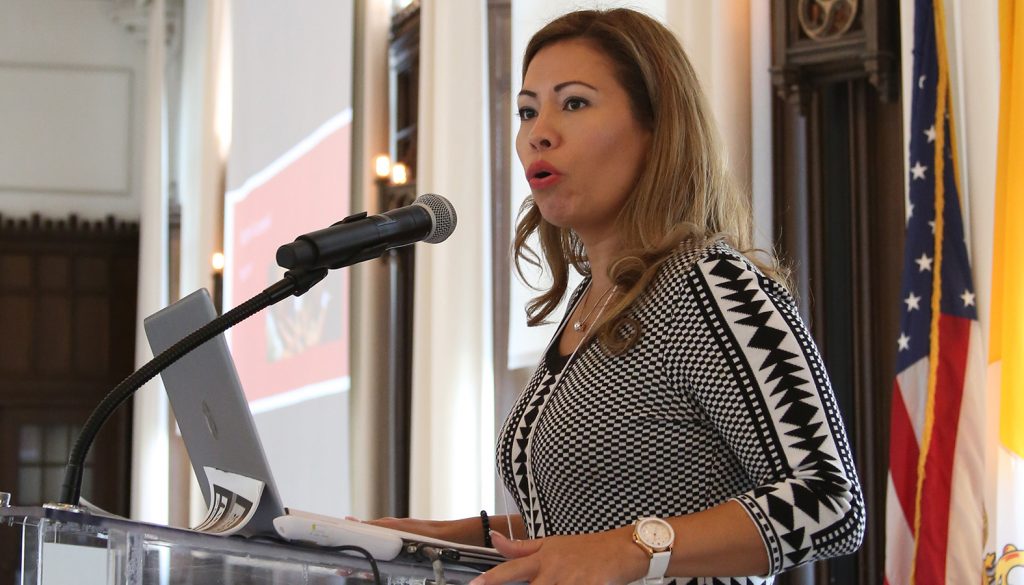The pastoral care of Hispanic families and immigrants, accompaniment of youth and young adults, and leadership development were the top priorities that Hispanic ministry leaders of seven dioceses, including the Archdiocese of Washington, addressed Oct. 5 at The Catholic University of America.
The gathering of about 50 Encuentro delegates, including laypeople, religious and clergy from episcopal region four, is part of the Fifth National Encuentro, or V Encuentro. This multiyear process that involves mission, consultation and community building, seeks to establish ways in which the Catholic Church can better respond to the Hispanic presence in parishes around the country.
"The Encuentro process has been a real blessing for us to go deeper in the reflection (of) what are we going to do with this challenge, which is an opportunity for us to continue to spread the good news" of Jesus, Washington Auxiliary Bishop Mario E. Dorsonville said in an interview with the Catholic Standard, Washington's archdiocesan newspaper.
The immigration crisis that affects thousands of Hispanic immigrants and their families has impacted individuals across the nation. Celia Rivas, immigration services coordinator for Catholic Charities of the Archdiocese of Washington, led a presentation on the topic.
Rivas explained that recent immigrants have been exposed to many forms of trauma, such as gang violence in their countries, sexual abuse, domestic violence, and even detention and family separations at the border. Once they are in the country, they may face other challenges such as loneliness and depression, unemployment, bullying and vulnerability to scams.
Undocumented immigrants and others with temporary protections, such as some Central Americans no longer protected by Temporary Protected Status, known as TPS, and recipients of Deferred Action for Childhood Arrivals, or DACA, live with the constant fear of possible deportations, Rivas said.
"Anything can trigger a deportation case for a person who is undocumented," she told the audience.
Creating parish communities that can accompany those families in their hardships is essential, continued Rivas, encouraging Encuentro leaders to seek volunteers who can help struggling families and individuals.
"It's important for every Catholic to be able to understand the sufferings and struggles that everyone has gone through to be able to come to this country, so we need to see the new immigrants practically with the face of Jesus Christ," Rivas said.
The Archdiocese of Washington is already facilitating information and trainings on immigration for pastors, priests, parish leaders and parishioners, so they are aware of what is going on, Bishop Dorsonville said.
Providing pastoral care to Hispanic families, many of them immigrants, was another priority addressed at the meeting. Raising children in a culture that they are not familiar with affects both parents and children, said Dora Tobar, director of the Pastoral Office for Family Life and the Hispanic ministry coordinator at the Diocese of Lafayette, Indiana.
Issues such as poverty, domestic violence and family separations due to immigration or divorce, alcohol and drug abuse also are also challenges that Hispanic families experience in this country, Tobar added. She suggested to find ways to develop support networks in parish communities to accompany those families.
"We need to become extended families for those who have arrived in this country and have not yet integrated to the community," Tobar said.
Tobar also stressed the importance of exploring new ways to reach those on the peripheries.
The presentations were followed by small group discussions. Karla Aleman, an Encuentro delegate for Diocese of Arlington, Virginia, reported her group's suggestions, which included integrating the pastoral care of families into existing diocesan offices.
Other recommendations addressed by the groups included empowering parents to assume their roles as first educators, increasing opportunities in adult faith formation, and updating resources and formation opportunities for ministry leaders.
Encuentro delegates also heard about collaborations with The Catholic University of America that are currently being explored to find ways to facilitate training opportunities for ministry leaders.
The purpose of this regional post-Encuentro meeting is to go over the final recommendations from the national gathering held last year and identify the most pressing needs to include in the final recommendations that dioceses will present to their bishops in the coming months.
"We want to present the bishops conclusions and concrete suggestions, so it is a book with action," said Comboni Missionary Sister Inma Cuenta, director of ethnic ministry in the Diocese of Richmond, Virginia.
The hope is that dioceses utilize the feedback and recommendations in their programs and planning and lead the way for parishes with Hispanic ministry to do the same.
"Everyone from management and leadership in our dioceses will return to their dioceses and meet with their bishops and will try to find a way to apply these recommendations, and to build up the supporting programs for our parishes to be able to fulfill their mission," Bishop Dorsonville explained.
According to estimates, more than 1.5 million Hispanics live in this episcopal area, which encompasses the Washington and Baltimore archdiocese and the U.S. Archdiocese for the Military Services, which has its headquarters in Washington, as well as the dioceses of Arlington and Richmond, Virginia; Wheeling-Charleston, West Virginia; and Wilmington, Delaware. Together they serve about 713,000 Hispanic Catholics in 160 parishes with Hispanic ministry.

